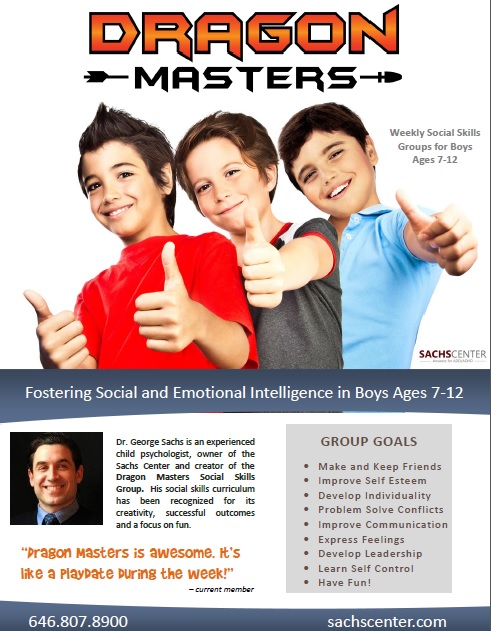Does your son need a boys social skills group? Leading authorities who have researched the subject of social and emotional learning have concluded that levels of adjustment, psychological health and academic achievement are directly related to a child’s social competency, emotional literacy, and ability to form successful peer relationships.
By learning to control impulses, express emotions and recognize the feelings of others, a boy is better prepared to enter into friendships and maintain them throughout elementary school. Healthy emotional and social developmental reaps well-documented benefits. Boys who have the ability to understand a peer’s emotions have a significant advantage in school and in life.
New Boys Social Skills Group NYC | Call 646-807-8900
Through validation, positive reinforcement, self-object mirroring, idealizing, twinship, and limit-setting, the boys learn to manage their emotions, problem-solve effectively and create positive peer relationships.

The boys social skills group is open to all boys between the ages of 8-12 that have been identified as struggling with social skill deficits, peer rejection, behavior and mood disorders that impact interpersonal relationships. Many of the children in the group have been diagnosed with ADHD or Aspergers.
With each successive level of achievement, the boys receive a different dragon t-shirt, rising in the ranks to the ultimate title of Wizard.
The philosophy of the Sachs Center social skills group is to assess each boy’s unique strengths and weaknesses individually, set goals and to monitor progress each semester. The social skills group is $100 per hour long session and currently meets Tuesdays, Wednesdays and Thursdays at 5:oo p.m. at our Upper West Side location.
Group Curriculum
The educational curriculum of the series will focus on the five core social and emotional competencies outlined by the University of Illinois at Chicago’s Collaborative For Academic, Social and Emotional Learning (CASEL, 2004). These core competencies are listed below:
Self-Awareness:
- Identifying emotions: Identifying and labeling one’s feelings.
- Recognizing strengths: Identifying and cultivating one’s strengths and positive qualities.
Social Awareness:
- Perspective-taking: Identifying and understanding the thoughts and feelings of others.
- Appreciating diversity: Understanding that individual and group differences complement each other and make the world more interesting.
Self-Management:
- Managing emotions: Monitoring and regulating feelings so they aid rather than impede the handling of situations.
- Goal setting: Establishing and working toward the achievement of short- and long-term pro-social goals.
Decision Making:
- Analyzing situations: Accurately perceiving situations in which a decision is to be made and assessing factors that might influence one’s response.
- Assuming Personal responsibility: Recognizing and understanding one’s obligation to engage in ethical, safe, and legal behaviors.
- Respecting others: Believing that others deserve to be treated with kindness and compassion and feeling motivated to contribute to the common good.
- Problem solving: Generating, implementing, and evaluating positive and informed solutions to problems.
Relationship Skills:
- Communication: Using verbal and nonverbal skills to express oneself and promote positive and effective exchanges with others.
- Building relationships: Establishing and maintaining healthy and rewarding connections with individuals and groups.
- Negotiation: Achieving mutually satisfactory resolutions to conflict by addressing the needs of all concerned.
- Refusal: Effectively conveying and following through with one’s decision not to engage in unwanted, unsafe, unethical, or unlawful conduct.
New Boys Social Skills Group NYC | Call 646-807-8900
Seventy-five studies, published between 1952 and 1983, in which children who received psychotherapy were compared with controls or children receiving another form of treatment. Results show that treated children achieved outcomes about two-thirds of a standard deviation better than untreated children. No differences in outcome were found to result from other treatment characteristics such as the use of play in therapy or the administration of treatment individually or in groups. The evidence suggests that previous doubts about the overall efficacy of psychotherapy with children can be laid to rest.
–The outcome of psychotherapy with children. Casey, Rita J.; Berman, Jeffrey S. Psychological Bulletin; 1985 Sep Vol 98(2) 388-400
